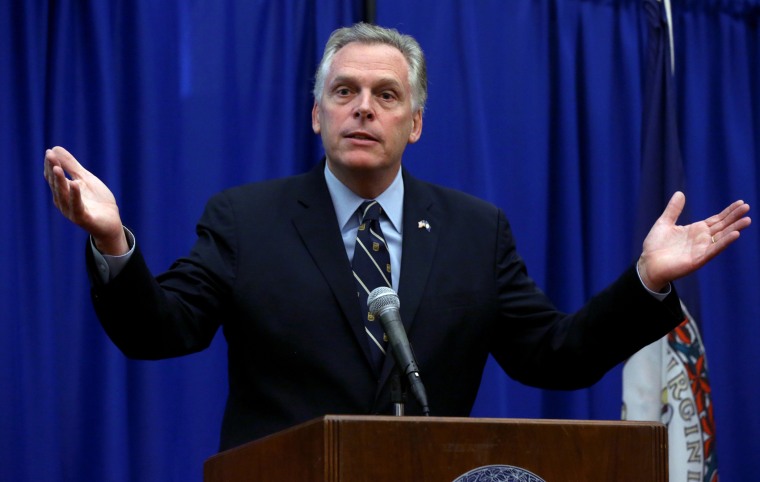When it comes to understanding why partisan gridlock has made policymaking nearly impossible, the most plausible explanation -- much of Republican politics has been radicalized, to the point that GOP policymakers are resistant to anything resembling compromise -- seems unsatisfying to much of the Beltway.
And so a variety of pundits and politicians have pushed an alternative explanation: this is President Obama's fault, because he just doesn't schmooze enough. If only the introverted president would establish friendships with lawmakers who refuse to work with him, the argument goes, we might see some real progress.
This may sound foolish for those who keep up on current events, but we've nevertheless heard the schmooze pitch
many,
many times.
It was fascinating to learn, then, that Virginia Gov. Terry McAuliffe (D), a few months into his term, has decided to put the schmooze theory
to the test, relying on his "celebrated talents for sociability and salesmanship" as a way to try to get important legislation through a divided General Assembly.
[I]t was no surprise that when Mr. McAuliffe was sworn in as governor of Virginia this year, he threw open the doors of the Executive Mansion, restocking the bar with craft beer and premium liquor and inviting lawmakers of both parties to 5 p.m. gatherings that were called the governor's happy hour.
If the Beltway assumptions are correct, leaders who take steps like these are bound to succeed. After all, we're told, policymaking is often about building relationships, so McAuliffe has gone out of his way to do exactly that.
And how's this working out?
Gov. Terry McAuliffe tried to shake up Virginia's deadlocked Medicaid debate Monday by proposing a new budget that would expand the health-care program and shower a projected $225 million in related savings on teachers, state employees, pre-kindergarten programs and other Democratic priorities. The governor's proposal was a nonstarter in the Republican-dominated House, whose Appropriations Committee rejected the offer in favor of a spending plan that does not expand Medicaid under the federal health-care law known informally as Obamacare.
The Medicaid expansion policy is a terrific case study, emblematic of a larger whole. The governor did exactly what one would encourage him to do: socialized extensively with lawmakers; he lined up support from Virginia Chamber of Commerce; he produced a non-partisan study showing that the policy would create tens of thousands of Virginia jobs; and he traveled the state to make the case to the public.
And for his trouble, Republicans wouldn't budge. McAuliffe offered a compromise -- accepting Medicaid expansion for just two years, effectively costing the state nothing -- which GOP lawmakers rejected, too.
The parallels to Washington, D.C., matter. A Democratic chief executive is eager to govern, but is finding it tough to pass bills through an upper chamber with a narrow Democratic majority, and a lower chamber run by conservative Republicans who are in no mood to accept concessions or strike deals.
So here's the question for all the Beltway voices who've blamed Obama's lack of schmoozing for Capitol Hill gridlock: what explains Virginia Republicans' obstinacy?
Robert Schlesinger had
a good piece along these lines yesterday: "[A]nyone who thinks that back-slapping joviality is the key to ending Washington gridlock need look no further than Richmond for its limits."
